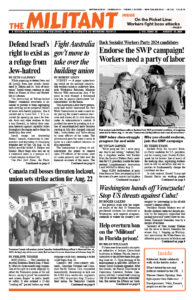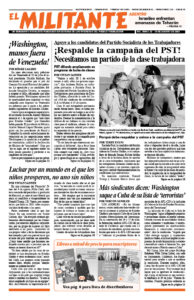The political crisis over the disputed results of the July 28 Venezuelan presidential elections has deepened as Washington, with imperial arrogance, continues to violate the country’s sovereignty by intervening in the oil-rich country’s internal affairs.
President Nicolás Maduro was officially declared reelected despite protests by the bourgeois opposition that polling place tally sheets show its candidate, Edmundo González, won by a margin of millions.
Secretary of State Antony Blinken had the nerve to declare González the winner Aug. 1. Stepping up Washington’s intervention, the White House has offered to grant amnesty to Maduro and his top officials if they relinquish power. They face U.S. extradition charges for alleged drug trafficking.
Washington is seizing on the crisis to step up its slander campaign to try to isolate the Cuban government. Wild claims have been made in the U.S. press about Cuban special forces being flown to Venezuela after the election. The Cuban Ministry of Foreign Affairs has categorically refuted these lies.
Leaders of the Democratic Unity Table opposition coalition demanded the official disclosure of printed voting tally sheets, as required by Venezuela’s electoral law. Refusing to release the data, Maduro instead asked the country’s Supreme Court to audit the election results. Opposition figures said this will bury the actual results behind closed doors.
Anti-government protests followed the election. Some were held in former bastions of working-class support for the ruling United Socialist Party of Venezuela, the political party formed by Maduro’s predecessor and mentor, Hugo Chávez.
A confrontation with National Guard troops and pro-Maduro paramilitary motorcycle gangs called “colectivos” left 25 dead. Tens of thousands marched Aug. 3 in support of Maduro. He declared he faced a rightist coup and launched a sweeping crackdown on opposition supporters, arresting over 2,400 people.
Washington seeks stable transition
Most governments in the region, whether friendly or not to Maduro, have questioned the results.
The presidents of Colombia, Brazil and Mexico have called for the voting records to be made public. They’re negotiating with representatives of the Venezuelan opposition and the Maduro government and with Washington.
The country’s attorney general, Tarek William Saab, opened an investigation Aug. 5 into both González and opposition leader María Corina Machado for allegedly spreading false information, inciting disobedience and insurrection. A long-standing opponent of the government, Machado was disqualified from running for president herself.
Over the past two years President Joseph Biden’s administration has been holding talks with Maduro’s representatives. Last October Washington promised to lift U.S. sanctions on oil and gas exports in return for the release of political prisoners and steps toward elections that Washington would deem “free and fair.” The accord unraveled when the Maduro government banned Machado from running and launched a fresh round of arrests of opposition activists.
The U.S. capitalist rulers are keen to resume exploiting Venezuela’s once-vast oil industry and for its crude to flow to global markets again amid energy disruptions caused by Moscow’s invasion of Ukraine. They also hope to blunt Caracas’ deepening collaboration with Moscow, Beijing and Tehran.
The crisis hitting Venezuela’s capitalist economy, deepened by U.S. sanctions, has ameliorated a little since 2014 when inflation skyrocketed and shortages of basic goods became widespread. Some 8 million Venezuelans have left the country.
Venezuela’s history of struggle
In 1989 a working-class rebellion known as the “Caracazo” exploded over steep price hikes, unemployment and deteriorating living and working conditions. President Carlos Andrés Pérez, of the Democratic Action party, sent the military to crush the protests, killing more than 3,000 people in Caracas alone.
Chávez was imprisoned in 1992 after leading a failed coup against Andrés Pérez. He was elected president in 1998 amid rising worker and peasant struggles. But neither he nor Maduro after him had any intention of leading the working class to take political power.
“We don’t have any plans to sweep away the oligarchy, the Venezuelan bourgeoisie,” said Chávez in 2007. Instead, his government used control over the state oil company, PDVSA, to redirect oil revenues toward social spending. This won widespread support among working people and the impoverished middle classes. That support began to erode as funds dried up when oil prices plunged, and the worldwide crisis of capitalism deepened.
Chávez’s course, continued by Maduro, fostered the growth of privileged social layers, including within the top brass of the armed forces. Today they are the mainstay of support for Maduro.
The inevitable consequences are growing demoralization and confusion among working people, even among those who for the last 20 years have fought against U.S. imperialism’s multiple attempts to intervene and overthrow the government. Millions continue to look for ways to fight for better wages, land, affordable health care, education and other rights.

